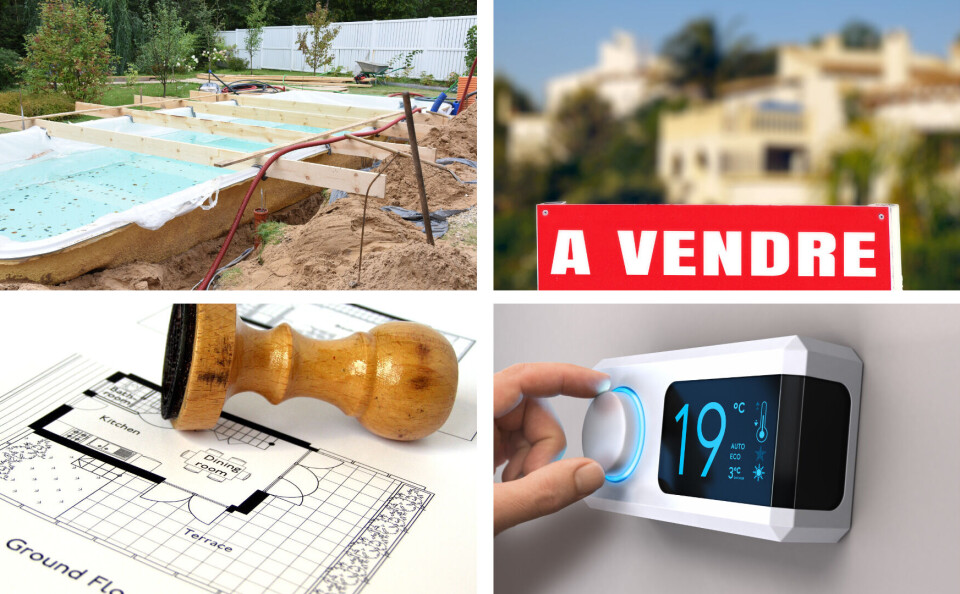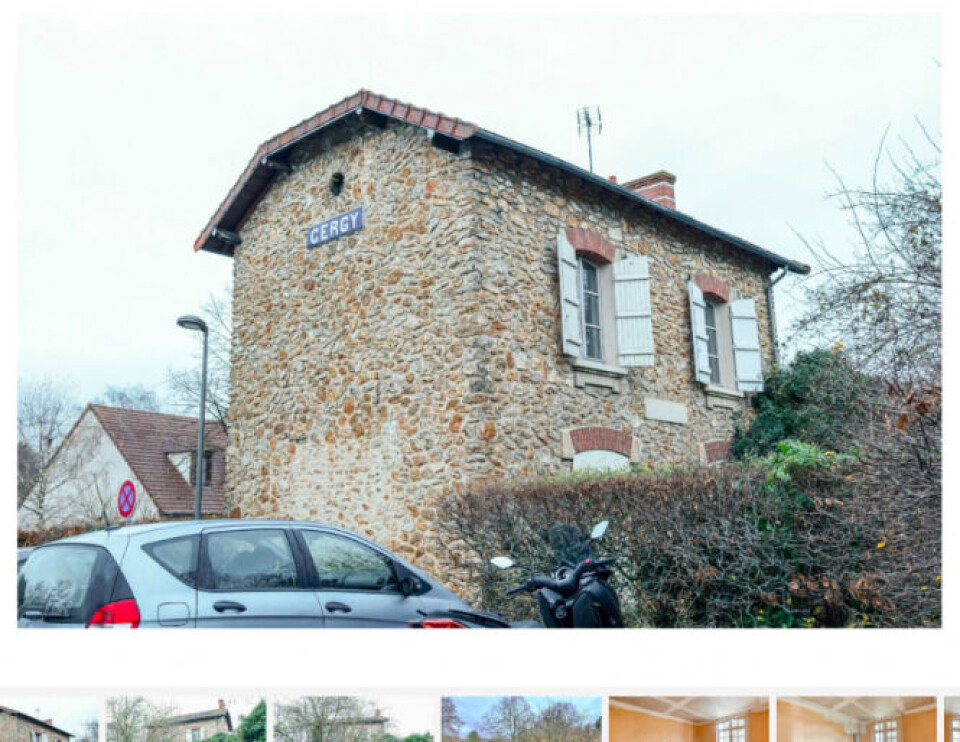-
Paris pledges action against voyeurs in public swimming pool changing rooms
It comes after several women came forward to report similar sexual assaults
-
France extends boiler replacement grants
New incentives offer larger grants for modest-income households to switch to efficient heating systems
-
Why do many think wood-fired boilers will be banned in France - and is it true?
A new poll found that a majority of people believe a ban on wood-fired boilers and stoves will come into force from 2027
Tax rise for home pools, market slowdown: Five French property updates
We also look at a case of ‘tacit’ planning permission gone wrong and support for fining people who turn their heating up too high

25% rate rise makes installing pools pricier
Building a pool will now cost more after legislation to raise the fixed value used in the calculation of the taxe d’aménagement was approved by MPs.
The fixed rate will jump from €200 to €250 per square metre for all swimming pool constructions.
Moreover, this amount will no longer be fixed as it was in the past, but rather updated each January 1 in line with the construction cost index established by the national statistics institute Insee.
The one-off taxe d’aménagement applies to work carried out in the home or garden of more than 5m² and where the height is greater than, or equal to, 1m80, such as building an extension, shed or pool.
It benefits municipal and departmental councils, which both set their own percentage rates for the tax.
To calculate the tax, each installation is assigned a ‘fixed value’ per unit (parking space, etc) or per square metre (swimming pools, solar panels, etc).
Once you have multiplied the fixed value by the taxable area of your project, the sum is then multiplied by the tax rate set by the local authorities.
Read more: New shed or pool at your French home? Remember the taxe d’aménagement
The new legislation, voted in by MPs on November 9, relates to increases in the fixed values for pools alone.
It was initially intended to affect other “installations spécifiques”, including caravan and tent pitches, ground-based photovoltaic panels and wind turbines.
However, another amendment approved on the same day excluded these from the increase, pointing out that in the context of soaring raw material and energy costs any rise could be detrimental to campsites and other holiday businesses.
Given the government’s commitment to sustainability, it was also deemed “contradictory” to increase taxation of renewable energy installations.
To help you calculate your taxe d’aménagement, the Ministry of Territorial Cohesion has a simulator on its website.
House prices slow down as supply outstrips demand
The soaring house prices that came with the onset of Covid are finally slowing down, new data shows, due in part to an increase in supply.
For the first time since the health crisis, for example, the website of the Bien'ici property group has noted a sharp rise in property for sale – up 12% over the year September 2021 - 2022.
At the same time, demand has fallen significantly with the website reporting 15% fewer searches this year and a 29% drop in the third quarter alone when compared to the same period in 2021.
The trend can be seen right across the country, reports BFM, although Paris is an exception.
Among regions where it is most obvious is Nouvelle-Aquitaine, which has seen a 10% drop in demand and an increase in supply more than twice that (+23%).
High mortgage rates and concerns about rising energy costs to heat homes have both been cited as factors for falling demand.
Supply, meanwhile, has been driven by a growing number of homes with very poor energy ratings entering the market ahead of new legislation to ban the least efficient homes from being rented.
The trend has seen a knock-on effect on house prices. The latest report from Notaires de France states that on the basis of pre-contracts, the annual increase in property prices would be limited to 5.7% at the end of December compared with 6.8% in the second quarter of 2022,
Read more: Small towns escape price rise slowdown: French property market trends
Houses, rather than apartments, are showing the greatest slowdown in price rises (+6,4 % against +8,5 % in the second quarter).
However, experts point out that property prices soared so high during the health crisis that the current slowdown cannot yet be classed as a ‘decline’, but rather a corrective.
Read more: Second-home market in France sees ‘extraordinary’ post-Covid boom
Homeowner refused €500,000 compensation for extension she believed she had ‘tacit approval’ to build
A homeowner in western France who built an extension despite not having explicit planning approval has lost her bid to be compensated €500,000 for construction and potential demolition costs.
The plaintiff, who has not been named, applied for permission to extend her ocean-facing villa in Le Pouliguen, Loire-Atlantique by 20m² in 2014 with a terrace and jacuzzi.
Having received no response within the legal deadline of two months after the application was submitted, she believed she had ‘tacit’ planning approval and went ahead with the project in 2015.
However, neighbours were upset by the work and filed an official complaint requesting its demolition.
Read more: Can I challenge a neighbour's extension plan in France?
An interim judge sided with the owner, agreeing she had ‘tacit approval’ to build, but the Nantes administrative court of appeal later overturned the ruling.
In spring 2022 the owner was back in court, this time asking for a demolition order on her extension to be dismissed. The case was thrown out, as the administrative court considered itself legally "incapable" of settling this type of dispute.
At the end of September the owner asked Nantes magistrates for €500,000 compensation from the commune for its mishandling of her planning application, as well as for building costs and money she might have to pay for demolition and [in] fines.
However, her request was rejected on October 18. The court found "the applicant was fully aware, at the time she carried out the extension work, that it was not authorised and that she was thus exposed to an action before the judicial court for demolition", reports Actu.fr.
While admitting the commune had made mistakes when dealing with her planning application, “this information was rectified each time and before the lady undertook the extension work on the villa," argued the judges.
The homeowner was ordered to pay €1,500 to the commune of Pouliguen to reimburse its legal costs.
The extension is still under threat of demolition.
Read more: I did not get permission for veranda at French home - what do I risk?
Town puts former station up for auction
A town on the outskirts of Paris is offering the chance to own a piece of railway history when its former station goes up for auction next week.

Photo credit: agorastore.fr
The station in Cergy (Val-d’Oise) was once a stop on the SNCF line linking Pontoise to Magny-en-Vexin, several decades before the arrival of the RER A in Cergy.
The 76m² millstone building has been valued at €243,000, although bidding will start at €180,000 when the sale takes place from November 22-24.
The site currently belongs to the municipality and includes a 241m² plot of land.
The house itself comprises four rooms but needs renovation before it can be used as a home, according to the online advertisement.
It is located in the centre of Cergy, next door to the Maison des Jeunes et de la Culture (MJC). Unoccupied for many years, the old station was used in the past as a home for guards and teachers.
"We would prefer it to be bought by a private individual to make it his or her main residence,” a spokesperson from the mairie told Le Parisien.
However, the decision to sell the station, which was made about a year ago by the town council, has not been universally popular.
Opposition councillor Alexandre Pueyo told the same newspaper: "The historical heritage of Cergy is not big and we should not sell it. What’s more, the building is next to the MJC and could have provided additional space for the town's associations as part of a wider renovation.”
Read more: Paris sells French chateau and holiday village for just over €200,000
The station was on a 36km route put into service at the beginning of the 20th century, but activity ceased after World War Two. The line, which also passed through Vauréal and Jouy-le-Moutier, is now a favourite with walkers.
When the line closed, Cergy was a mere village with little more than 1,000 inhabitants. However in the 1960s, faced with the fast development of Paris and its suburbs, planners decided to create several new towns around the capital to control and balance the spread.
To this end, Cergy was integrated into nearby Pontoise to create the ‘new town’ of Cergy-Pontoise, and the population expanded rapidly.
Although Pontoise is the official capital of the Val-d'Oise department, the prefecture building and administration, as well as the conseil général, are located inside the commune of Cergy itself.
Fine people who heat their homes too much, says survey
People in France would be in favour of punishing people who do not respect government advice to limit their heating to 19C this winter, according to a recent survey.
The government has made heating a central element of its so-called energy sobriety (sobriété énergétique) plan to reduce the risk of shortages over the coming months, insisting thermostats should not be set above 19C in homes, business and public buildings.
Read more: Heating, transport, télétravail: What is France’s energy saving plan?
While it will not be policing the rule, a survey conducted by heating firm Rothelec in October found more than 68% of respondents believe it would be beneficial to punish people who flout it. Only 27% were against the idea and 5% preferred not to comment, reports BFM.
In terms of punishment, more than half (54% of respondents) wanted a fine of €1,500 or more.
By law, companies can already be fined €1,500 (€3,000 for a repeat offence) under a decree of July 25, 1977 and Article 241-25 of the Energy Code, which sets a limit of 19C on premises.
While the French are in favour of sanctions, almost half of them say they themselves will not comply with the government's demands.
Read also: 'Automatic water heater switch-off could save France from blackouts'
An earlier study by Rothelec, published in September, found 45% of respondents intended to reduce the heating in their homes by a few degrees this winter, but 44% said they would not and 11% had not yet made up their minds.
Other sections of the French media have also been debating the 19C guidance in recent weeks, with TF1info asking whether it might pose a health risk.
While conceding the World Health Organisation lists 18C as a safe indoor temperature “to protect the health of general populations during cold seasons”, it quoted several medical experts picking out potential problems.
One advised that having a general rule, which did not differentiate between “people in old people's homes who are going to be lying down and classes of high school students", would require “vigilance”.
Related articles
Self-heating homes, holiday lets: Five French property updates
Time to sell not buy property in France advise majority of notaires
Pool problem, ‘rent with option to buy’: Five French property updates
























